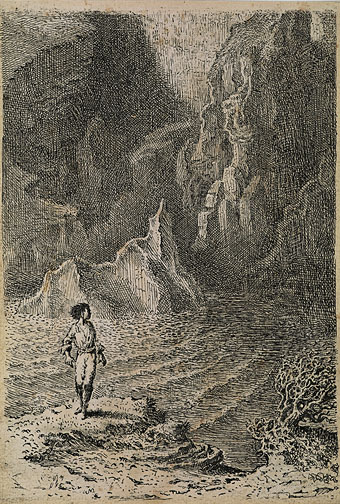
Jim Hawkins in Treasure Island. An illustration by Mervyn Peake, 1949.
• “Since it was 1967 when I became a teenager, I suspected that the Now would stir together rock ’n’ roll bands and mod girls and cigarettes and bearded poets and sunglasses and Italian movie stars and pointy shoes and spies.” Luc Sante on hs youthful search for The Now.
• “…in response to listener requests to play ‘more music like This Heat’, [John] Peel responded that he couldn’t because ‘nobody else sounds like them’.” Alexis Petridis on the mighty This Heat, the band who tried to change everything.
• “While I hesitate to deploy the overused and near-devalued word shamanic here, it does smell right. Or rite.” Ian Penman on the polychromatic delirium of Parliament and Funkadelic in 1970.
Anyway, we knew this new culture was there, we knew this phenomenon was occurring, centered in the Haight-Ashbury, so after this event, we dramaturges sat together and tried to think it out. What is this, in terms of breaking down the fourth wall? How is this a historical follow-through for Antonin Artaud on one hand and Bertrolt Brecht on the other? How did these two come together in this? What do you call this, when you provoke riots and use the audience as members of the cast? When you can stage events that brings the audience on the stage—but there is no formal stage? But it’s a theatricalized event…? It’s all new. So I called it ‘guerrilla theater.’ And Ronnie heard that phrase, and wrote an essay about doing Left provocative theater. That wasn’t what I saw. I saw it as being deeper than that. And I began writing plays that now were for sure plays except that a lot of the dialogue was spontaneously derived from the performers—we had some really great performers at the Mime Troupe at the time, I’d say there were at least a dozen good performers, and a couple who were really brilliant. Anyways, put these people together, I gave them a context, and we began improvising dialogue.
Peter Berg of the San Francisco Diggers talking to Jay Babcock for the sixth installment of Jay’s verbal history of the hippie anarchists
• “I love improvisation. I still do. For me it’s the way I like to be acting, you see.” RIP Michael Lonsdale, talking in 2015 about Jacques Rivette’s Out 1.
• “Would you find this bookstore beautiful or terrifying? Or both,” asks Jonny Diamond.
• Yukino Ohmura uses stationery store stickers to create dazzling nightscapes.
• At Spine: Penguin Books celebrates 85 years with original artworks.
• Strange Selectors by Various Artists on Werra Foxma Records.
• Daisy Dunn on the gentle genius of Mervyn Peake.
• This Heat: Rimp Ramp Romp (1977) | Repeat (1979) | Makeshift Swahili (1981)

What an astonishing discovery THIS HEAT is! Over here in the states I had no idea. One question though. In a lot of the documentation they’re described as “post-punk”. Given the timeline of the original band what does that term even mean?
Stylish bookstore! Designed for everything except comfortable browsing. But I’m sure the Chinese government has already done the hard work of making sure only the best and most wholesome choices are available for purchase. I must not think bad thoughts, indeed.
Was the Diggers’ project really as well thought out as Berg portrays it? If we went back in time and experienced it ourselves isn’t it likely we would find it a bit messier than that?
Yes, This Heat are unique. I don’t think their albums had US releases so it’s taken a long time for their music to travel. Post-punk is a very broad term, applied to just about everything post-78 that was new. This Heat got caught up in the broadening acceptance for new sounds just as Cabaret Voltaire did even though the people involved had been making music pre-punk and were never really punk groups. One of the pieces I linked to above, Rimp Ramp Romp, is closer to King Crimson circa 1974 than anything from the punk world.
I only really know about the Diggers from Jay’s interviews but they seemed more analytical than the Yippies. A few of them, anyway: Berg, Emmett Grogan and Peter Coyote (the actor). Berg makes the point that he was slightly older than the hippies flocking to the Haight, and had already been doing things pre-hippy. This gave them a head start, and a clearer sense of what might be possible. Like This Heat they took advantage of a change in the social sphere to push their own ideas.